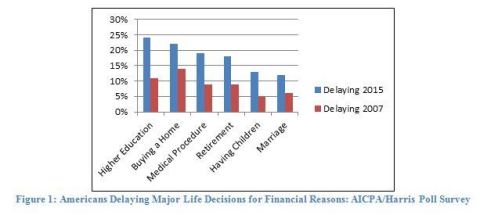NEW YORK--(BUSINESS WIRE)--Buying a home or starting a family are just a few of the major decisions that people might regard as milestones in their lives. However, a new survey found that a majority of American adults (51 percent) have delayed at least one important life decision in the last year due to financial reasons. This represents an increase of 20 percentage points from a similar survey conducted in 2007, when 31 percent of Americans reported delaying a major life event.
The new survey, conducted by phone for the American Institute of CPAs (AICPA) by Harris Poll in March among 1,010 adults, found many of the specific life events Americans are delaying for financial reasons have more than doubled since the 2007 survey.
Those events include:
- Higher Education (24 percent delaying in 2015, compared to 11 percent in 2007)
- Buying a Home (22 percent delaying in 2015, compared to 14 percent in 2007)
- Medical Procedure (19 percent delaying in 2015, compared to 9 percent in 2007)
- Retirement (18 percent delaying in 2015, compared to 9 percent in 2007)
- Having Children (13 percent delaying in 2015, compared to 5 percent in 2007)
- Marriage (12 percent delaying in 2015, compared to 6 percent in 2007)
“When making major life decisions like buying a home or getting married, it’s crucial that you consider both the short and long-term financial implications,” said Ernie Almonte, CPA, chairman of the AICPA’s National CPA Financial Literacy Commission. “If you don’t have adequate savings in place or you’re having trouble paying your bills, it may make sense to hold off on major life decisions until you’re on more solid financial footing.”
For those delaying these major life decisions, the primary cause is a lack of savings, cited by 60 percent of Americans. This was followed by concerns about the U.S. economy (50 percent), difficulty paying non-mortgage monthly bills (39 percent) and medical bills (29 percent). Additional reasons Americans delayed life decisions are a need to take care of elderly parents or other relatives (29 percent), pay down credit card debt (28 percent), as well as concerns about losing their job (27 percent) and difficulty making mortgage payments (25 percent).
However, the news is not all bad. The survey found that a vast majority (85 percent) of Americans report having made positive changes to their financial behavior since the recession. That includes following a monthly budget (58 percent), increasing their savings rate (44 percent) or adding to an emergency fund (35 percent)—among other things.
“The most reliable way to afford the costs of major life decisions is to start saving at a young age and increase your savings rate whenever possible,” Almonte added. “The calculators on the 360 Degrees of Financial Literacy website are a great resource for people looking for help creating a savings plan.”
To help Americans put themselves on more solid financial footing, the AICPA’s National CPA Financial Literacy Commission recommends the following steps:
- Start or increase your savings rate – increasing savings can provide households with the funds to enjoy extras without impacting their daily finances.
- Start or continue following a monthly budget – following a monthly budget ensures that households are living within their means and can reduce or eliminate the amount of incurred debt.
- Put less money on credit cards – decreasing incurred debt is an excellent way for Americans to feel more in control of their finances.
- Start or add to an emergency fund – this will enable Americans’ daily finances to be less impacted by unexpected costs associated with medical procedures, natural disaster or other events.
Methodology
Harris Poll has conducted an annual survey for the AICPA since 2007*. This year’s poll was conducted by telephone within the United States between March 19 and 22, 2015, among 1,010 adults (506 men and 504 women age 18 and over), including 510 interviews from the landline sample and 500 interviews from the cell phone sample.
*In 2007, AICPA participated in Harris Interactive’s March 2-7, 2007 National Quorum omnibus telephone study. The National Quorum was a bi-monthly survey among 1,000 U.S. adults ages 18 and older.
About the AICPA
The American Institute of CPAs (AICPA) is the world’s largest member association representing the accounting profession, with more than 400,000 members in 145 countries, and a history of serving the public interest since 1887. AICPA members represent many areas of practice, including business and industry, public practice, government, education and consulting.
The AICPA sets ethical standards for the profession and U.S. auditing standards for private companies, nonprofit organizations, federal, state and local governments. It develops and grades the Uniform CPA Examination, and offers specialty credentials for CPAs who concentrate on personal financial planning; forensic accounting; business valuation; and information management and technology assurance. Through a joint venture with the Chartered Institute of Management Accountants (CIMA), it has established the Chartered Global Management Accountant (CGMA) designation which sets a new standard for global recognition of management accounting.
The AICPA maintains offices in New York, Washington, DC, Durham, NC, and Ewing, NJ.
Media representatives are invited to visit the AICPA Press Center at aicpa.org/press.

